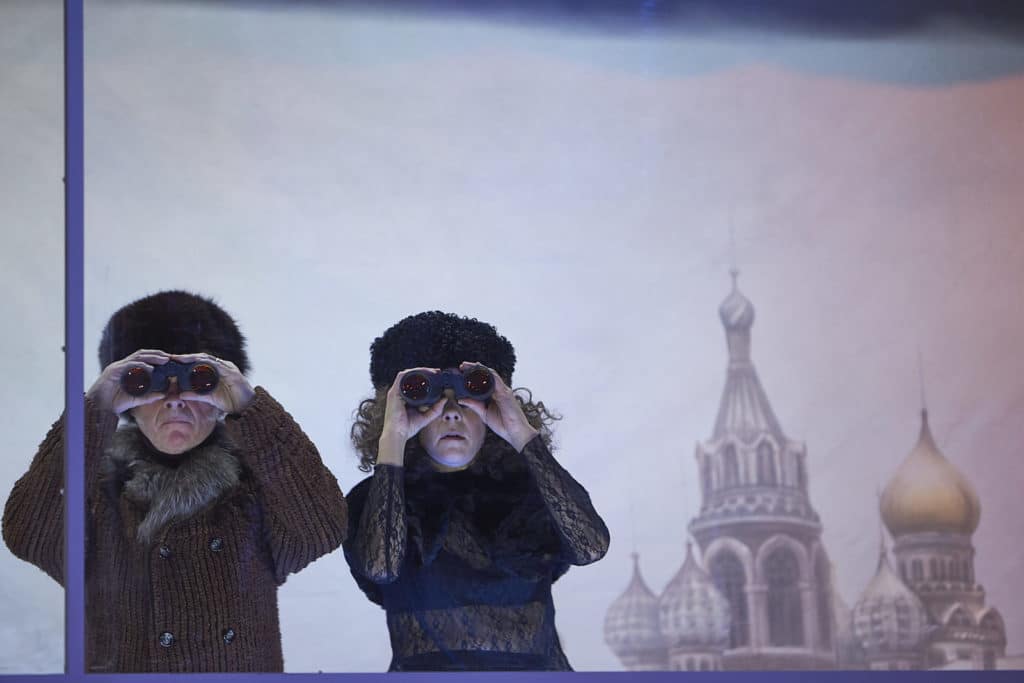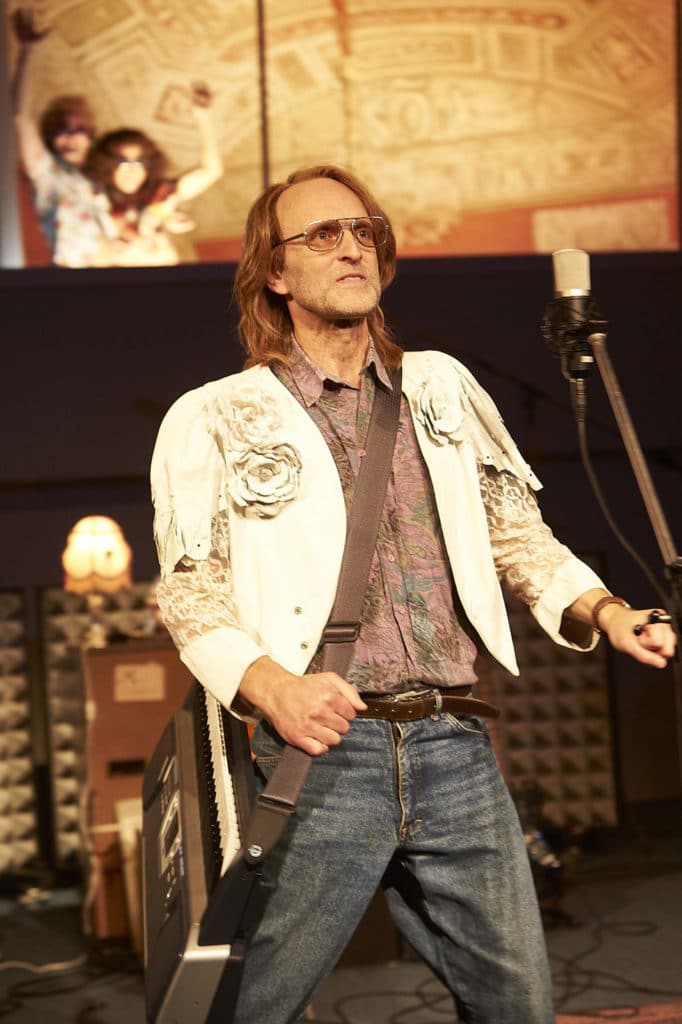Germans and humour. I have a bad experience with that. Will largely be because I don't get the finer nuances of the language, especially if it is meant for laughter. So it's not that the German sense of humour is wrong. Indeed, sometimes in German theatre something can just happen that makes you laugh.
Therefore, I don't want to cut too much grass at the feet of the reviewer on duty, but if you want to experience German humour of the warm and good kind, hold space in your diary now for 'Anna Karenina - Allerdings mit anderem Text und auch anderer Melodie', which will be shown in Amsterdam on 8, 9 and 10 June. Incidentally, also useful if you that fat book hadn't read just yet, but want to be able to talk about it. They do the 1,000 pages in just under two hours.
Sports and music teacher
I spoke to the creative brains of this masterpiece, Clemens Sienknecht and Barabara Bürk, after a performance in Hamburg. There, the pair are permanent members of the local city company. Sienknecht, trained as a sports and music teacher, is responsible for the compositions in this performance, which plays in a seventies-looking radio studio. His work for this Anna Karenina consists of arranging countless evergreens from the soul and disco era, to be performed live by the actors.

Bürk adapted Tolstoy's classic novel about a woman torn by doubt between a wild lover and a dull husband, ultimately leading to a dramatic death under an oncoming train. (No spoiler here, readers can already feel that coming in chapter 1.)
Stripped
It may have become clear from the above that Anna Karenina is not performed by the Deutsches Schauspielhaus Hamburg entirely literally and in historical settings. Sienknecht and Bürk have a special approach to this piece, similar to their two previous adaptations of classic novels: Effie Briest and Madame Bovary. Those classics were also stripped down and set to music.
Clemens Sienknecht ('I feel like a musician above all, but I like it when people say I can act quite well for a musician.') developed his talent as a musician with Christoph Marthaler. There he also got to know his life partner, as Barbara Bürk (indeed) was at the time directing assistant to the man who managed to liven up German theatre in the 1990s with radical theatre adaptations full of music and drunkenness.
Once working as an independent theatre maker, Sienknecht mainly made music performances. Until he wanted something else: 'I had become a bit fed up with just making music. There was always a story in it, but I had to think of everything myself. I then read Effie Briest during the summer holidays and thought I wanted to turn it into my musical theatre.'
Famous side jumps
To do so, he needed the help of Barabara Bürk. Thus was born the successful collaboration that is now attracting packed theatres across Germany for the third time. It was not agreed beforehand that they would do the three great love novels of world literature. That, like much in Bürk and Sienknecht's work, was coincidental, Barbara explains: 'For our piece on the German novel Effi Briest, Clemens had built in that we would say at the end: this is the first part of a series of famous side jumps in world literature. Next time: Anna Karenina. I thought that was a good joke, so decided to go along with it, but I hadn't read a letter of the book by then.'
After reading it, she was won over: 'Anna Karenina as a character is naturally fascinating. The ending is harsh. She is then hysterical and totally confused, she doesn't know what she wants, she wants a better life but doesn't know how. She is afraid to be free, but she cannot choose.'
Doubt
'That's another funny thing about the novel. When you read that thick book, it changes ten times from separation to staying together, or still separating, no, rather apart. Who wants a divorce anyway? She wants a divorce. No, she doesn't want to separate, he wants to separate. All divorce, but in the end no one knows who actually wants what anymore. Anna Karenina doesn't know what she wants, except that someone takes care of her.'
So you can understand something of how Barbara goes about editing: 'In the end, the script does not exceed 30 pages, while the novel has 1,000. So the hardest work was to keep exactly what we needed when deleting. So we threw away a lot.'
That it nevertheless became a faithful performance, Sienknecht can explain: 'Of course the quality of a book like Anna Karenina is beyond any doubt. You cannot say of that book that it is bad. You can say we made a lousy adaptation of it, but the book is untouchable.'
Soap
'The main thing is that they are monuments of world literature,' adds Bürk: 'People know them even if they haven't read them. So you can make jokes about those stories, because everyone has some idea what they are about. We wouldn't be able to do this with stories that nobody knows.'
'Comes naturally to the fact that it is mainly about love and betrayal. It's almost soap opera-like. Those books have that in common with a lot of musical pieces. That makes it very easy to find songs to match the novels.'

And that's where Clemens Sienknecht's special approach comes in. He explains why the play is full of nostalgia for the 1970s and 1980s: 'That's because it's our time. All the people on stage are pretty much the same age. It would be possible to use any kind of music, but this is the choice we made. We also started the work with just music.'
Bürk: 'Meanwhile, I sit at home to write the play, together with the dramaturge. The actors haven't seen a text by then.'
Sienknecht: 'And I sit down with the actors to collect our favourite songs. In this play, most of the music is also recited by the actors.'
Bürk:' For Clemens, it is important that the actors have fun singing. So then it is also better that they pick the music themselves.'
Sienknecht: 'It is then up to me to put them together in a good arrangement. That's when songs can fall by the wayside.'
Nervous
Bürk: 'Three weeks before the premiere, it gets really difficult. Then we start editing everything and the actors see their lines for the first time. Then we keep making all kinds of adjustments, right up to the last rehearsal. This makes the actors nervous, and on top of that they are also unsure about the music. Especially in this case, because some actors also play an instrument, while they are not used to that at all. Sometimes I do think the actors are more afraid of singing out of tune than of playing their roles well.'
Sienknecht: 'That the leading lady does not have a professional singing voice is therefore not a problem. The audience forgives her. In the same way that I very much want to be seen as a musician, for people to say: for a musician he acts quite nicely, it is important for her that people say: for an actress she sings quite nicely.'
Garrison Keillor
Incidentally, the idea of performing the piece in a radio studio is not entirely original. Sienknecht and Bürk were explicitly inspired by the live radio show 'A Prairie Home Companion by Garrisson Keillor'. They learned about this uniquely American phenomenon, which thrived on the host's über-warm voice, through the film Robert Altman and made about it in 2006.
Sienknecht: 'In 2009, I was thinking up a show. The name we came up with was Studio Roh, but then I saw Robert Altman's latest film and thought: this is it. I don't want a studio on stage, but radio. In the show now, we are trying to create the relaxed atmosphere that Garrison Keeler also has in his show. It may all look a bit improvised, but it's completely written out, down to the last second.'
This also explains the warm humanity in the humour: 'We were very serious about the novel. The novel is just not very funny. So the last half-hour of our performance is also not very funny.'
Mealy
Bürk: 'We were sometimes worried about whether we were going too far. But at such moments I thought to myself: we always have the music. From my own experience, I knew that with the music it would always be fair again. That's why things could never get out of hand, even if we had a few jokes that were really corny. As soon as the music starts, the feeling becomes genuine. This is also because Clemens is so exact and precise when rehearsing the music with the actors, and has so much love for the music, that it never gets corny.'
